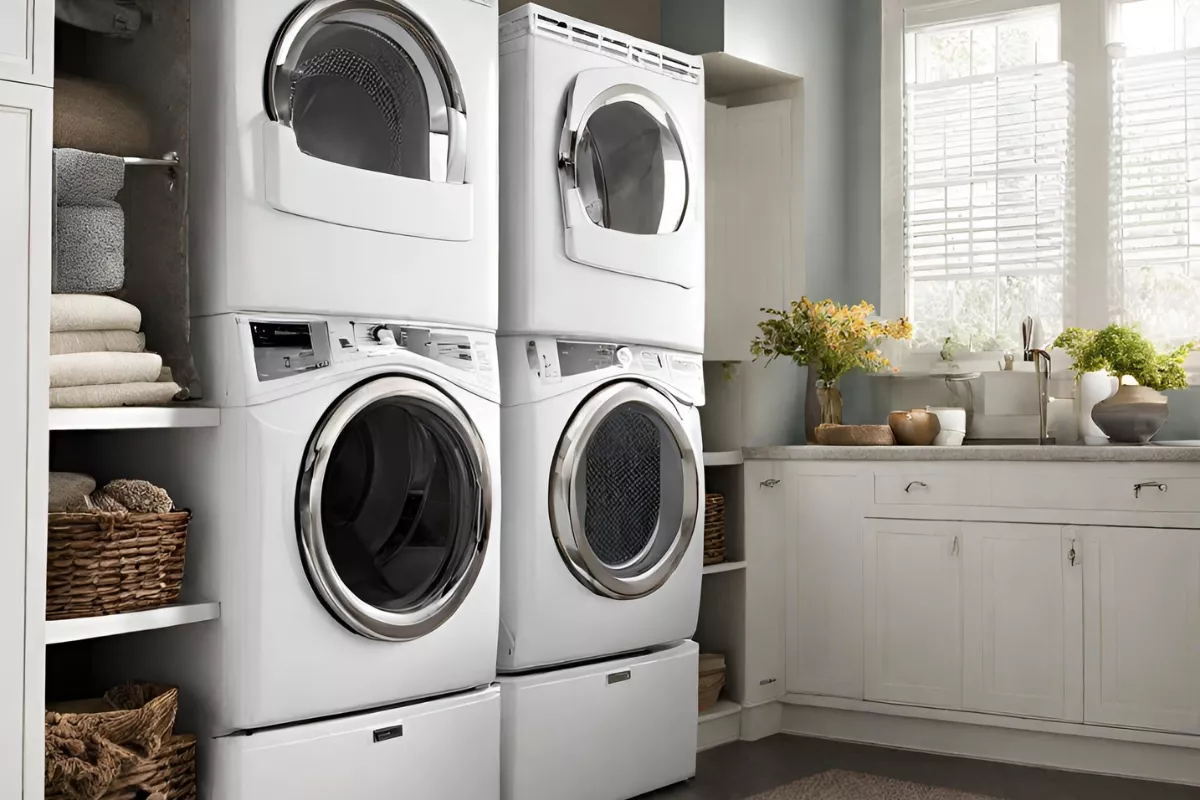When looking to purchase a new clothes dryer, the pivotal decision often boils down to choosing between a gas and an electric model.
This choice is not just about what connections are available in your home; it also involves understanding the distinct advantages and considerations each type offers, especially if you're in the process of building a new home, remodeling your laundry area, or contemplating a switch from one type to the other.
Gas and electric dryers come with their own set of requirements, efficiencies, and price points, making it crucial to weigh these factors carefully.
Whether you're swayed by the convenience of an electric plug-and-play model or the efficiency and quick drying times of a gas dryer, knowing the ins and outs of each can guide you to a decision that aligns with your home's infrastructure and your personal lifestyle needs.
This integrated perspective aims to provide a comprehensive overview, helping you navigate through the pros and cons, and other essential considerations, ensuring you make an informed choice that suits your specific circumstances.
Electric vs. Gas Dryers: Key Differences
While both gas and electric dryers need electricity for their basic functions like turning the drum and powering controls, the key difference lies in how they generate heat. Gas dryers tap into a gas hookup, using natural gas or propane alongside electricity, which contributes to their distinct BTU output.
This dual-source operation allows them to heat up quickly and efficiently. In contrast, electric dryers rely solely on electricity for all their functions, including heat generation.
When it comes to installation and home compatibility, there's a notable contrast. Electric dryers are known for their installation ease, requiring only a 240-volt outlet, which makes them a versatile option for many homes.
On the other hand, gas dryers demand a more complex setup due to the need for both a gas hookup and a 120-volt outlet, often necessitating professional help to ensure safe and correct installation.
Despite these differences in operation and installation, gas and electric dryers are comparable in terms of performance, offering a range of innovative features, sizes, and styles to meet various laundry needs. The choice between the two ultimately hinges on the existing utilities in your home and personal preferences for efficiency and convenience.
Energy Efficiency and Operating Costs
Generally speaking, gas dryers tend to be more efficient compared to their electric counterparts. This efficiency comes from their ability to heat up rapidly and produce a higher level of heat, which results in quicker drying times for clothes.
On the other hand, electric dryers require more time to reach their optimal temperature and do not achieve the same level of heat as gas dryers, leading to longer periods of electricity usage to dry clothes effectively. For those looking to cut down on their electricity bills, opting for a gas dryer could be a beneficial choice.
Safety and Maintenance
Electric dryers carry risks of fire and electrocution, which can be largely minimized by following certain safety measures. These include having the dryer professionally installed, ensuring its wiring is intact and in good condition, regularly cleaning the unit, removing lint as per the manufacturer's guidelines, avoiding overloading, and maintaining a clean environment around the dryer to prevent any fire hazards.
In contrast, gas dryers present the additional dangers of gas leaks and carbon monoxide emissions, which could lead to fire incidents or poisoning. These risks can be mitigated through professional installation, proper ventilation, and the strategic placement of a carbon monoxide detector near the appliance, thereby enhancing safety.
Safety considerations are inherent to both electric and gas dryers, yet adhering to certain precautions can greatly diminish these concerns. This safety awareness is not limited to dryers alone but is relevant to all large appliances that are connected to the electrical and gas systems within a home.
Which Dryer is Right for You?
Your choice will depend on several factors, including your home's existing utilities and your long-term plans. If you have a gas hookup and plan to stay in your current home for a while, a gas dryer might be more economical in the long run. If you're in a home without a gas line or you plan on moving soon, an electric dryer could be more convenient and cost-effective.
Can You Switch From Gas to Electric or Vice Versa?
Converting your dryer from gas to electric or vice versa is generally discouraged due to the complexities of their distinct heating systems, the risk of causing damage to the appliance, and the likelihood of voiding the manufacturer's warranty.
While technically possible, such a switch is not recommended because of the practical challenges and potential harm it could bring to your appliance, making the process impractical and inadvisable.
Durability and Lifespan
The lifespan of gas and electric dryers is quite similar, with gas dryers typically lasting around 13 years and electric dryers around 14 years. Therefore, longevity might not be the key deciding factor when choosing between the two.
What's more critical for ensuring the durability of either type is regular maintenance. This includes thorough cleaning, using the dryer as intended, and following the manufacturer's maintenance guidelines. Such practices play a pivotal role in maximizing the lifespan of any dryer, whether it's powered by gas or electricity.
Benefits and downsides
Gas dryers are known for their energy efficiency and faster drying times, requiring both an electrical outlet and a gas connection. They can be pricier upfront and may come with higher maintenance costs. Safety is a concern due to the additional hazards posed by gas usage, but with proper care, these risks are manageable.
Electric dryers, on the other hand, offer a wider variety of models and are more affordable initially. They need a 240-volt outlet and generally consume more electricity, making them less efficient than gas models. However, they're easier to maintain and might be the only option for ventless setups, such as in some apartments. Over time, the lower initial cost may be offset by higher utility bills, especially if used extensively.
Both types have their pros and cons, with the choice often coming down to existing home infrastructure, personal preferences, and long-term cost considerations.
People also ask
Do electric dryers just plug in?
Yes, they require a 240-volt outlet for operation. An electric dryer comes with a thick power cord that directly plugs into a standard electrical outlet, eliminating the need for a gas connection. In contrast, a gas dryer not only plugs into a standard electrical outlet but also requires a connection to a gas valve, typically located near the back of the appliance.
Which is easier to maintain?
Maintaining a gas dryer often incurs higher costs compared to an electric dryer, mainly because servicing a gas dryer usually requires the expertise of a certified technician. Additionally, there's the inherent risk of gas leaks during repairs, which could pose significant risks to both the property and its inhabitants.
Conversely, electric dryers are generally simpler to upkeep. Even those with minimal experience may find diagnosing and fixing common issues straightforward, thanks to the availability of parts and their ease of replacement.
While homeowners always have the option to enlist professional repair services, doing so may negate any financial benefits of handling maintenance independently.

 Marcio Vasconcelos
Marcio Vasconcelos





